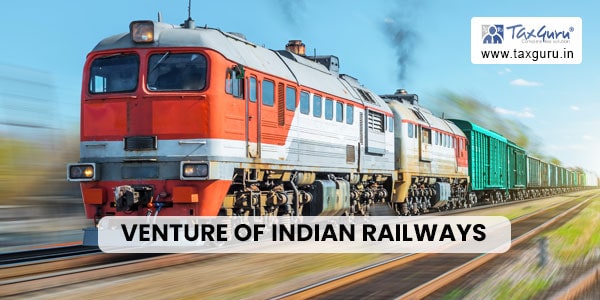The CESTAT, Mumbai in Konkan Railway Corporation Limited v. Commissioner of Service Tax [Service Tax Appeal No. 87709 of 2019 dated June 22, 2023] set aside the order passed by the Commissioner by observing that assessee is ‘a deemed to be a railway company’ under the provision of Indian Railways Act, 1890 and since Indian railways was exempt from payment of service tax no service tax liable on the assessee.
Facts:
M/s. Konkan Railway Corporation Ltd. (“the Appellant”) entered into an agreement on dated July 15, 2002 (“the Agreement”) with Ministry of Railways, Government of Maharashtra, Government of Goa, and Government of Kerala for construction of new broad gauge railway. As per the agreement the Appellant was allowing Indian Railways to use the railway lines and signals and systems, for the transportation of goods and passengers.
The Appellant was receiving consideration from Indian Railways for usage of infrastructure facilities including railways tracks.

The Revenue Department noticed that charges were paid for allowing Indian Railways to use infrastructure which comes under ‘Business Support Service’ which is taxable under Section 66B(44) of the Finance Act, 1994 (“the Finance Act”) for the period on or after July 01, 2012 and under Section 65(104c) r.w Section 105 (zzzq) of the Finance Act for the prior period.
Subsequently, 2 Show cause notices, one for the period 2009-2014 dated October 20, 2014 and for the period 2014-2015 dated May 02, 2016 (“the SCN”) were issued demanding duty with interest under Section 75 of the Finance Act and penalties under Sections 76 and 77, and penalty under Section 78 of the Finance Act.
The Appellant was unsuccessful in contesting the case before the Commissioner and approached the CESTAT for seeking necessary relief against the confirmed demand.
The Appellant contended that, the main objective of the Appellant was to construct Konkan Railway lines and operate them for a period up to which it discharges the liabilities arising out of the project and the cost of service shall be met by equity and by collecting loans, debentures, bonds, etc., with the equity participation of Indian Railways of more than 50%.
The Revenue Department contended that the Appellant and the Indian Railways are two different persons from point of view of charging service tax. Thus, the Appellant was liable to pay service tax on the amount received as business support services.
Issue:
Whether services rendered by the Appellant to the Indian Railways is liable to service tax?
Held:
The CESTAT, Mumbai in Service Tax Appeal No. 87709 of 2019 held as under:
- Observed that, Indian Railway and the Appellant are two separate units functioning under the main unit namely Indian Railway’s administrative control.
- Further observed that, as per the agreement executed among government of India and four federal units, the company that is formed (the Appellant) would be “deemed to be Railway Company” under the provisions of Indian Railway Act, 1890.
- Noted that, purpose of bringing the Appellant into existence was to facilitate early completion of railway line with financial, infrastructural and managerial support so that project would be executed in a better way. Further, there was no agreements regarding profit sharing and ultimately assets would go to railway company upon meeting of expenditure incurred in the project.
- Stated that, there is no flow of ‘consideration’ to the Appellant and to the Indian Railway even as a separate unit so as to subject it to an independent entity under the category of service.
- Held that, the Appellant and the Indian Railways are not separate entities and since Indian Railways is exempt from paying service tax, the Appellant is also exempt from payment of service tax.
- Set aside the order passed by the Commissioner.
Conclusion: The CESTAT Mumbai’s ruling in favor of Konkan Railway Corporation Limited brings relief by exempting the appellant from service tax liability. The decision acknowledges the appellant’s status as a deemed railway company under the Indian Railways Act and the absence of separate consideration flowing between the appellant and Indian Railways. This ruling sets an important precedent and provides clarity on the applicability of service tax in similar cases. It is crucial for businesses in the railway sector to understand the implications of this ruling and ensure compliance with tax regulations.
****
(Author can be reached at info@a2ztaxcorp.com)





